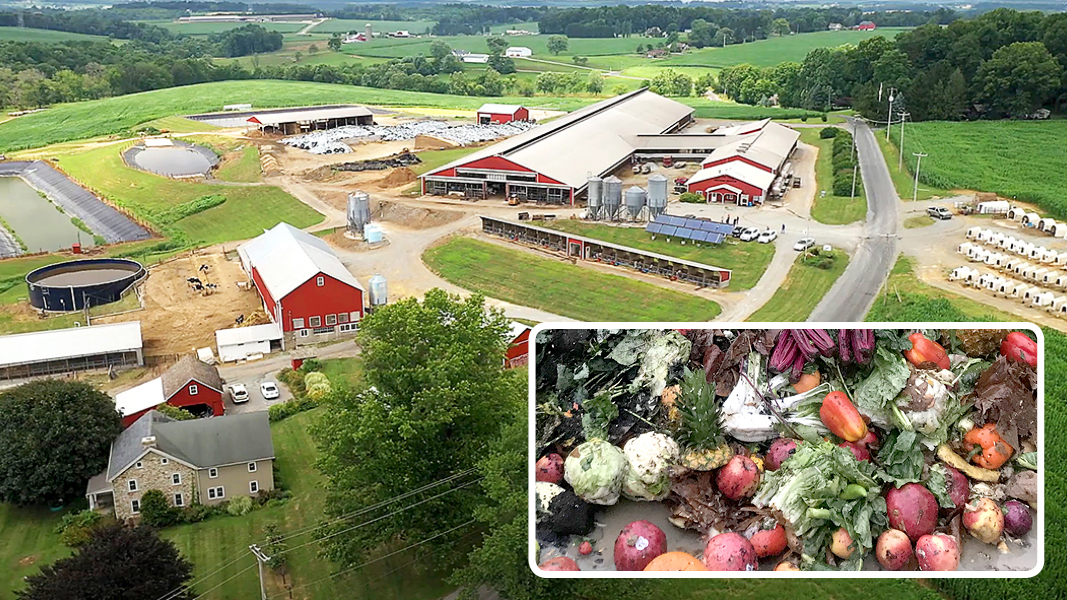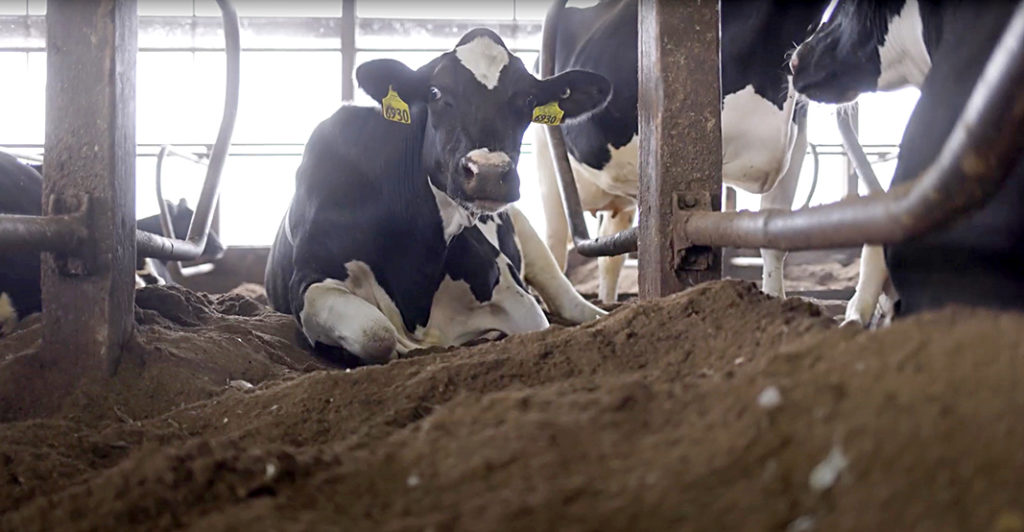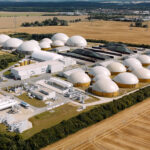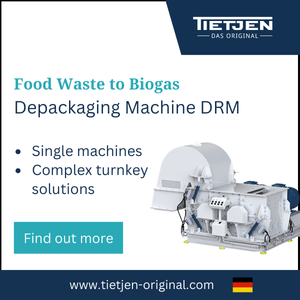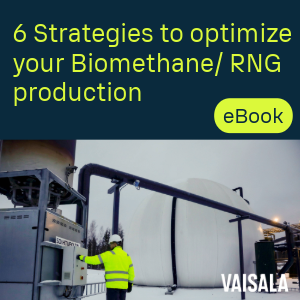Top: Food waste supplied by Natural Upcycling (inset) is fed to dairy cows or anaerobically digested at Ar-Joy Farms in Cochranville, Pennsylvania. Farm photo courtesy of ADANE; Inset photo courtesy of Natural Upcycling
Nora Goldstein
In 2012, Ar-Joy Farms in Cochranville, Pennsylvania received a grant from the state’s Center for Dairy Excellence to assess the feasibility of installing an anaerobic digester (AD) at its dairy farm. While the economic and environmental benefits looked promising, available grants weren’t enough to help cover the capital costs of the project. “That gradually changed, and we broke ground in spring 2017 to install a DVO Inc. Two-Stage Linear Vortex™ complete mix, plug flow digester,” says Duane Hershey, who owns Ar-Joy Farms with his wife, Marilyn Hershey. “Total cost of the project was about $2.5 million, and some funding was provided by the Pennsylvania Commonwealth Financing Authority.”
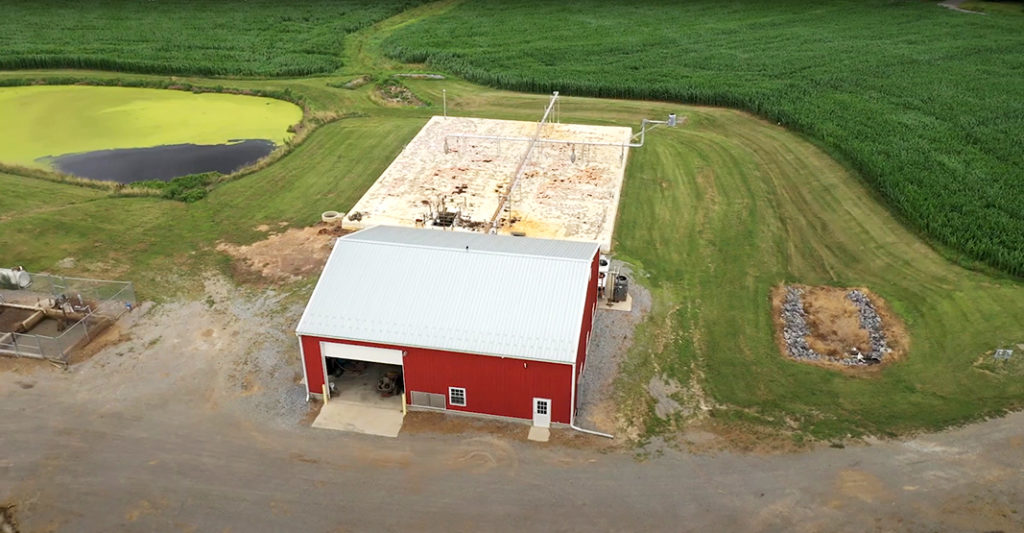
Ar-Joy Farms has a 700,000 gallon complete mix, plug-flow digester system supplied by DVO, Inc. Photos of farm (top), digester, cows on bedding, and genset are courtesy of American Dairy Association North East (ADANE) “Fun on the Farm” video, “Farm Ecology with Farmer Marilyn.”
While doing the feasibility study, the Hersheys had an opportunity to meet Chris Noble and tour the Noblehurst Green Energy AD facility at Noblehurst Farms in Linwood, New York. The farm codigests dairy manure with various food waste streams, including source separated organics (SSO) from grocery stores. As described in a profile in BioCycle CONNECT last month, Noble formed Natural Upcycling, an organics collection company, with Harry Cohen in 2014. Natural Upcycling has expanded its service throughout the Northeast and Mid-Atlantic regions, including Pennsylvania. Once the Ar-Joy Farms’ digester was up and running, the Hershey family decided to accept loads of food waste from Natural Upcycling.
“Ar-Joy Farms accepts clean produce waste from several of our customers for dairy cow feed, as well as incorporates SSO collected exclusively supplied by Natural Upcycling from local Wegmans grocery stores and other customers into their anaerobic digester,” explains Noble. “The conveyance and grinding system for the SSO was modeled after the system we built at Noblehurst.” Adds Duane Hershey: “It is neat to see how our initial visit to Noblehurst’s AD facility has blossomed.”
The farm milks 725 registered Holsteins and has about 100 dry cows. It also raises heifers. Prior to installing the digester, the cows were bedded on sand. “We stopped using sand and the flush dairy system, as we planned to utilize the digested solids for bedding,” explains Hershey. “That transition was hard as the sand helped prevent the cows from slipping. We ended up putting grooves in the concrete, which addressed the problem.”
Food Waste Flow
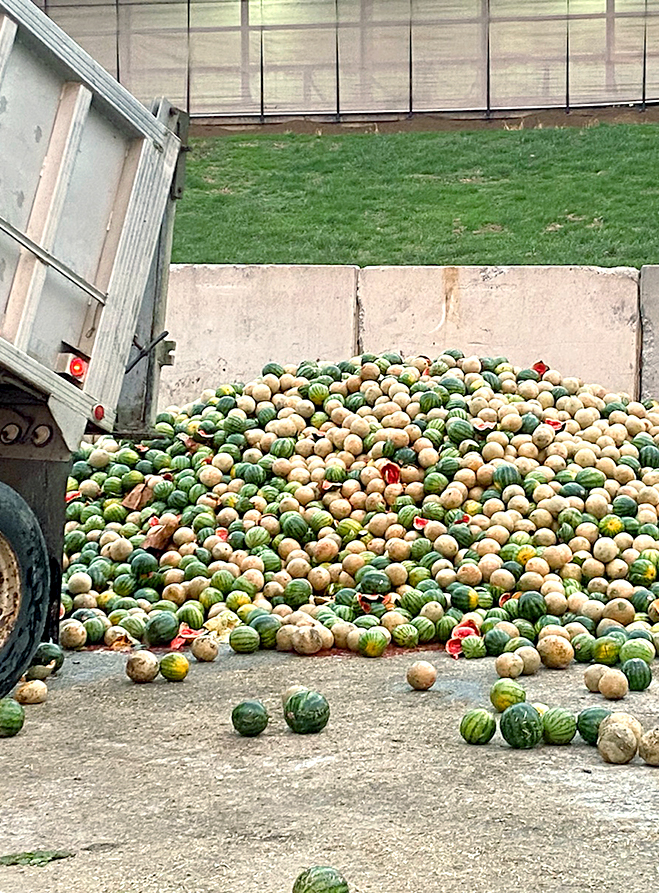
A mix of watermelon, cantaloupe and honeydews are part of the current “diet” fed to the farm’s herd. Photo courtesy of Ar-Joy Farms
Natural Upcycling hauls food waste from a range of generators to a variety of processors in the region. It brings Ar-Joy Farms about 60 tons/week of SSO for the digester, and about 40 tons/week of produce to feed to the cows. The current “diet” is mostly watermelons, honeydews and cantaloupes. “We put them in a TMR mixer equipped with knives and when we go to feed, it looks like water,” says Hershey. “We call it sweet water, which accounts for about 1 lb of dry matter/animal. They love it!”
The SSO is conveyed into a Vogelsang X-Ripper, which pulps the material into 1- to 2-inch particles. The processed food waste is mixed with the manure and liquid food processing waste and pumped into the digester. “We have been taking a liquid DAF (dissolved air flotation) product from a local potato chip manufacturing plant since we started up the digester,” he adds. “In addition, we get about 4 tons/week of white starch from the plant that we feed to the cows. The starch replaces some of the corn meal in the feed.”
Capacity of the digester is 700,000 gallons; retention time is 21 to 23 days. Solids are separated with a screw press and put in a pile, where they go through a natural heating cycle to stabilize the material prior to being used as bedding. Digested liquid manure is stored in a lagoon and used as fertilizer. “Food waste adds to the nutrients in the manure,” says Hershey. “When we updated our nutrient management plan, we needed to add a couple 100 acres to the existing 600 acres we farm in order to manage the liquid manure.” Ar-Joy Farms grows corn for silage, and plants cover crops after the corn is harvested.
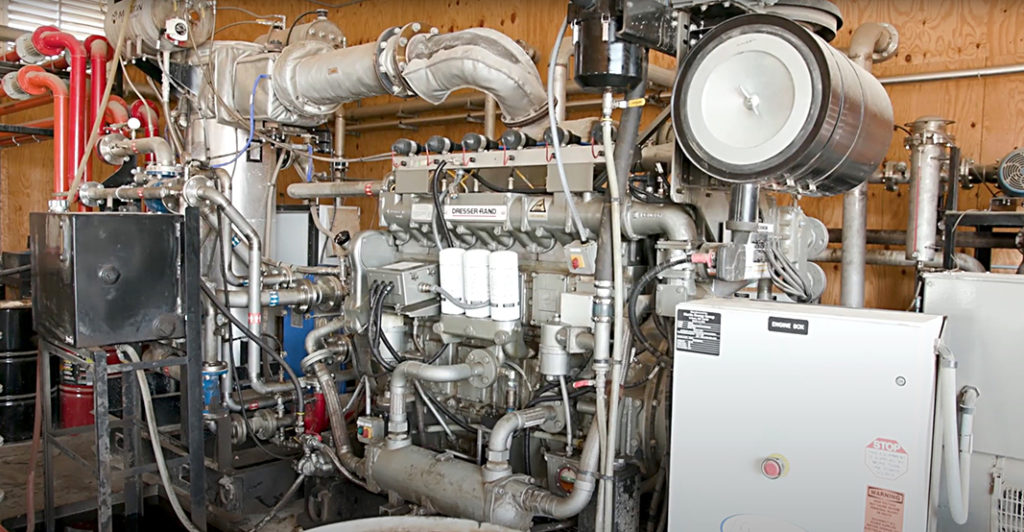
A 335 kW engine generates power that is used on the farm, as well as put on the grid via a net metering agreement with a utility. Photo courtesy of ADANE
Biogas is fed to a 335 kW Guascor combined heat and power engine. Recovered heat is used for the digester. Ar-Joy Farms has a net metering arrangement with PECO Energy Company. It was the first net metering contract that PECO had with a dairy farm digester, noted Marilyn Hershey in a 2020 podcast interview with Dairy Voice. Excess generated power not used by the dairy is currently sold to PECO for about $0.04/kWh, down from $0.06/kWh when the digester first began operating.


